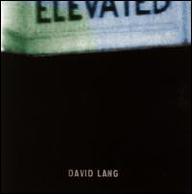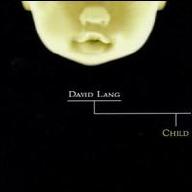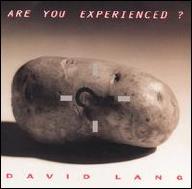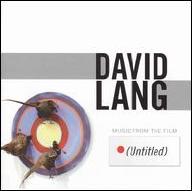Born in Los Angeles on January 8, 1957, Lang's primary instrument of study growing up was trombone. After earning his undergraduate degree at Stanford in 1978 and completing his Master of Music from the University of Iowa two years later, he won student composer awards from the BMI Foundation in 1980 and 1981.
In 1987, Lang co-founded New York music collective Bang on a Can with Julia Wolfe and Michael Gordon. Through performance and recordings, the project frequently bridged the gap between avant-garde and popular music. Lang then finished his doctorate in composition from Yale University in 1989. His impressive list of teachers through the years included, among others, Jacob Druckman, Hans Werner Henze, and Martin Bresnick.
Bang on a Can released their debut studio album, Industry, in 1995, with Cheating, Lying, Stealing following on Sony Classical a year later. Universal imprint Point delivered their next release, a 1998 re-imagining of Brian Eno's Ambient 1: Music for Airports that often turned Eno's sketches for tape recorders into elegant works for live musicians. In 1999, Lang drew notice for his opera The Difficulty of Crossing a Field, a work whose libretto was inspired by an Ambrose Bierce short story. The piece was scored for and premiered by the Kronos Quartet, along with vocal soloists. Also from 1999, The Carbon Copy Building, a so-called comic-strip opera by Lang, Wolfe, and Gordon, won the Village Voice OBIE Award in 2000. The three composers worked together again on the opera Lost Objects, which featured a mixed chorus, vocal soloists, full orchestra, and guest appearance by turntablist DJ Spooky. It was released on Teldec in 2001. Recordings of his own works around this time included 2001's The Passing Measures (for bass clarinet, amplified orchestra, and women's voices) and 2003's Child, which was recorded with the chamber ensemble Sentieri Selvaggi, led by Carlo Boccadoro.
Many of Lang's larger works have come as the result of commissions, including The Little Match Stick Girl Passion, which was a co-commission by the Carnegie Corporation and the Perth Theater and Concert Hall. Based on the Hans Christian Andersen fable, the choral work won Lang the 2008 Pulitzer Prize for Music. Two years later, the recording by Paul Hillier and Theatre of Voices took home the Grammy Award for Best Small Ensemble Performance.
In the meantime, Bang on a Can continued to release a steady stream of albums, including 2010's Steve Reich: Double Sextet; 2x5 (Nonesuch) and 2012's Big, Beautiful, Dark and Scary (Cantaloupe). Commissioned by Carnegie Hall and Stanford Lively Arts, his work Death Speaks premiered in early 2012. A 2013 recording featured performances by Shara Worden (vocals, bass drum), Bryce Dessner (guitar), Nico Muhly (piano), and Owen Pallett (violin, vocals). Drawing for anthems the world over, Lang's composition The National Anthems premiered at the Walt Disney Concert Hall in 2014. The Los Angeles Master Chorale recording followed on Cantaloupe in 2016. That year, Lang also became an Oscar nominee in the category of Best Original Song for "Simple Song #3" from the multilingual film Youth.
Among Lang's next compositions were a one-act chamber opera for solo baritone titled The Loser, and Prisoner of the State, an opera based on Beethoven's Fidelio that was premiered by the New York Philharmonic in 2019. Recordings of both The Loser (Cantaloupe) and Prisoner of the State (Decca) appeared in 2020.
In the meantime, following the sudden death of composer Jóhann Jóhannsson in 2018, Lang stepped in to score the film The Village Detective. Performed by accordionist Frode Andersen, the soundtrack appeared on Cantaloupe Music in early 2021. ~ Robert Cummings & Marcy Donelson, Rovi















